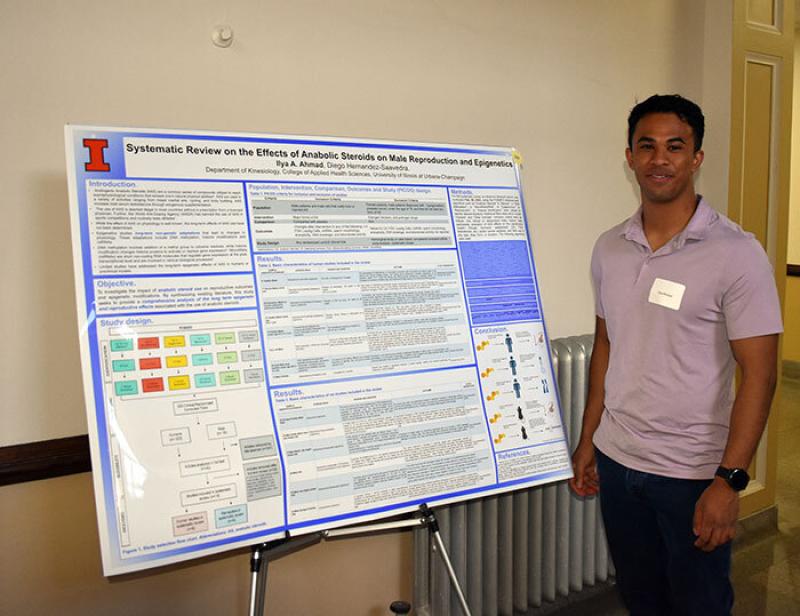
AHS students find varied paths to research
By ETHAN SIMMONS
For her last semester as an undergraduate student, Daniela Hernandez spent a lot of time in campus libraries—more than the Community Health major had in her entire college career.
But all of Hernandez’s hours in the Main Stacks and Grainger Engineering Library went toward a worthy cause: conducting a literature review for her first research study, exploring the labor market value of Spanish-English bilingualism.
“It was very ambitious of me to do this my last semester of college, but it was something that I had never done before,” Hernandez said. “So I was like, ‘Why not?’”
Hernandez is enrolled in the Illinois Academic Enrichment and Leadership Program or I-LEAP, a support and mentorship program for underrepresented minority students, student-athletes and first-generation students in the College of Applied Health Sciences such as her.
“I'm excited to pass this on to my (I-LEAP) mentee and just say, ‘Hey, this is a great opportunity to develop those skills that you might not have,” she said.
Dozens of students from AHS lined the walls of Huff Hall on Wednesday to present findings from their recent research endeavors working in the labs of their mentors. The presentations coincided with the university-wide Undergraduate Research Symposium on April 27.
Plenty of paths exist for AHS undergrads looking for research involvement. There’s Students Pursuing Applications, Research and Knowledge (SPARK), which onboards high-achieving freshmen into research programs within the college, and Student Aging Researchers in Training (START), which brings students from underrepresented backgrounds into aging research.
Department of Speech and Hearing Science juniors Natalia Rzepa and Holly Panfil found their first research experiences through START and SPARK, respectively.
Both found their way into in SHS Associate Professor Raksha Mudhar’s Aging and Neurocognition Lab and stuck around because they liked it so much.
With SHS doctoral candidate Lizzy Lydon and School of Molecular and Cellular Biology senior Sharbel Yako, the group compared brain activity between older adults and younger adults during word recall tests.
Though both groups performed comparably in the test, event-related spectral perturbation data collected from participants suggested older adults had to use higher levels of neural compensation during the exercise, Panfil said.
“Research opens a lot of doors, and I think that we’re so lucky to be at a university that has so many different labs and ways to get involved,” said Panfil, who’s heading for a Fulbright-MITACS Globalink research internship in Canada this summer. “I’d really recommend it to anyone to just give it a shot.”
For Recreation, Sport and Tourism sophomores Genna Peters and Vanessa Ramos, their presentation “Developing a Quality Evaluation Protocol for Racial Equity Park and Recreation Plans" was just a snapshot of their progress. Working with mentors RST Associate Professor Mariela Fernandez and doctoral student Wonjin Jeong, the students will reach out to community members.
Ramos, who transferred to Illinois from DePaul, called her first stab at research “a great experience.”
“Being able to learn how to work as a group, collect data, and just having someone to guide me through my first year at UIUC has been very helpful,” Ramos said.
Especially for underclassmen, joining a study can seem an intimidating task. Community Health sophomore Afnaan Afsar Ali transferred into AHS late last year, wanting a “broader outlook” on healthcare, but didn’t initially care for exploring any research opportunities.
“I think there’s a lot of fear when you first begin to try and get into a research lab,” Afsar Ali said. “But it does get easier, the whole purpose of research is so that you are able to develop as well.”
However, some of the college’s work with health technology caught her interest. She contacted the Human Factors and Aging Laboratory led by KCH Professor Wendy Rogers, which connected the sophomore to an interview-based project involving sociable robot “Misty,” one of which exists inside the McKechnie Family LIFE Home.
The project titled “Understanding the Role of a Socially Assistive Robot to Successfully Age in Place” surveyed eight older adults on their comfortability and interest in the open-source programmable robot after seeing videos of Misty in action.
The eight adults, surveyed from across the country, all had warm responses on Misty’s appearance, size and functions, Afsar Ali said. Participants came up with three main use areas for the robotic companion: Completing domestic tasks, setting daily reminders, and socializing at home.
Afsar Ali assisted in the literature review, sifting through previous research on the role of robots and health tech in the lives of older adults, and helped conduct video conference interviews with participants.
“I realized that we have a really big misconception about how older adults feel about technology,” Afsar Ali said. “I thought that they wouldn't be open to it at all, but they really are—they want to be involved and have more technology in their lives, things that can support them.”
With a bit of luck, undergrads can find research labs that perfectly fit their interests. Fitness buff Ilya Ahmad, a senior in Kinesiology, combined two of his favorite topics for his presentation: working out and hormone function.
Under KCH Assistant Professor Diego Hernandez-Saavedra, Ahmad reviewed the effects of anabolic steroids on the body. He discussed how steroids impedes the body’s ability to produce testosterone, which can cause decreases in testicular size, sperm count and sex drive. Steroids can also cause other hormone dysregulation, and even cause DNA damage, he said.
A first-generation student, Ahmad said he had “no idea about research” when he came to the University of Illinois. He wants to attend medical school after graduation, but knows he wants to keep research in his life.
“I love research. I love endocrinology,” Ahmad said. “It’s kind of cool to show people things that are based on research findings.”
Find out more about the AHS Undergraduate Research Expo at this site, including a list of all projects.
